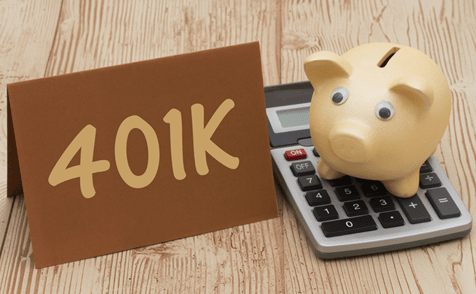What Is a 401k? (Understanding 401K)
Social Security is a safety net, but it is definitely not a comfortable cushion to live off of in retirement. Supplementary sources of income include pensions and a person’s individual savings or investments. One popular way of saving for retirement is to open a 401k account.
Most people have heard of a 401k, even if they aren’t clear what makes such an account so special. What is a 401k? In a nutshell, it is a tax-advantaged account with a defined contribution that is taken out of an employee’s earnings.
What is a 401k in relation to a regular savings account? Theoretically, you can use money from your regular savings or investments in retirement, so what are a 401k plan’s special features?
A 401k receives contributions directly from the employer. A percentage of an employee’s earnings are put into the account before taxes. This is known as tax-deferred earnings.
A 401k account holder is not required to pay taxes on this portion of his/her earnings until that individual withdraws the money later. In some cases, employers match their employee’s 401k contributions.
See Also: 6 Tips on How to Build Wealth (Steps, Ways & Habits of Wealthy People)
The Name of the 401k Explained
While researching the question, ”What is a 401k?” you may also be curious about its uncreative, alphanumeric name.



401k Explained
The account gets its name from the area of the tax code that makes its features possible: section 401(k) of the Internal Revenue Code that allows individuals a tax break on deferred income.
Contributed income and any income via capital gains from investments in the 401k plan are not taxed until withdrawn.
What Is a 401k Plan: Guidelines & Restrictions
A 401k is also known as a defined contribution plan. What is a 401k’s main selling point? Aside from its tax-deferred earnings, it’s a retirement savings option that can receive contributions from the individual, his/her employer or both. The fact that employers can match an employee’s contributions makes the 401k an attractive option for many.
But what is a 401k’s restriction? If the taxman is going to give you a break, there has to be a catch. There are strict limitations and guidelines on 401k plans, but, technically, they benefit the individual by ensuring they keep the money saved for retirement.
How does a 401k plan work when it comes to your employer’s contributions? While you can access your personal contributions to your 401k at any time, the contributions from your employer usually cannot be touched until retirement. Furthermore, individuals cannot contribute an unlimited amount of money. The IRS sets an annual contribution limit, and it is adjusted each year to account for inflation.
This year’s contribution limit is $18,000. That said, things work a little differently if you are approaching retirement age. How does a 401k plan work for older individuals? There is an exception for people over the age of 50 who can contribute slightly more each year in the form of “catch-up” contributions. This exception was introduced to allow people who had not saved as much as they should have and who were nearing retirement, to put more money into their 401k.
While it is not mandatory for 401k plans to offer catch-up contributions, most plans do. In fact, 97.1% of all 401k plans allow for catch-up contributions. That said, a significantly smaller number of employers match those catch-up contributions.
Withdrawing Money from a 401k Plan Prior to Retirement
As mentioned, the money contributed by your employer is not always vested (meaning that it is not accessible to you). On the other hand, your contribution is vested, so individuals have 100% ownership of and access to their money and investments. Naturally, account holders are usually curious about the question, ”How does a 401k plan work in cases of early withdrawals?”
What is a 401k plan’s limitation in the case of withdrawals before retirement? As expected, there are penalties since the money is given its tax-deferred status as a way to encourage people to hold off on touching their nest egg until they’ve stopped working. Early withdrawals are subject to regular state and federal taxes plus an additional 10% penalty tax. So in the case of an emergency, your contributions to your 401k plan are liquid – you’ll just be required to pay the taxman a little extra.
Individuals can start withdrawing penalty-free from their 401k plan once they reach 59.5 years of age. What is a 401k plan’s requirement for accessing its funds penalty-free? In some cases, you can withdraw your money from your plan without paying the hefty 10% penalty tax. Those who suffer from a permanent disability that prohibits them from working can access their money penalty-free. But keep in mind that this income is still subject to regular income tax.
Don’t Miss: What Is a Fico Score? What You Should Know! (What Is a Good Score & Definition)
What Is a 401k Plan: Benefits
Unlike pension plans, a 401k plan provides individuals with the power to decide how their contributions are invested. Similar to any other investment account, you can opt to invest in a variety of assets such as stocks, bonds, and mutual funds. Some people hire professionals to manage their accounts for them.
Contributing to a 401k can reduce how much income tax those in higher tax brackets have to pay. Since the contribution is deducted from your annual income, you may wind up paying less to the government each year. And since your income is bound to be lower in retirement, you will most likely fall into a lower tax bracket, allowing for further tax savings.



How Does a 401k Work?
What is a 401k plan’s eligibility requirement? An employer can impose a waiting period on a new employee before allowing him/her to open a 401k plan. On top of that, they may implement a longer wait period before they start matching contributions.
In the unfortunate circumstance that you have to file for bankruptcy, your 401k plan is exempt from creditors. While bankruptcy is a situation you would hopefully never be found in, the protected status of your 401k can provide some peace of mind.
Related: Best Financial Goals to Set
All-in-One Change Management Tools
Top Rated Toolkit for Change Managers.
Get Your Change Management Tool Today...
What Is a 401k Plan: Borrowing Money from Your Retirement Savings
Things happen, and those things may require immediate cash that you do not have on hand. Even so, you may be hesitant to jeopardize your retirement savings, not to mention unwilling to pay a penalty tax in addition to regular taxes by withdrawing from your 401k. That said, your 401k might hold your only significant assets.
What is a 401k plan’s flexibility when it comes to borrowing instead of withdrawing money from it? If you require a short-term loan, borrowing from your 401k is an option. So long as the borrower follows the 401k loan’s conditions, the borrowed money is not taxed. In addition, the fact that you are compelled to pay it back in a certain amount of time keeps your retirement savings plan on track.
Not all plans provide for 401k loans. Those that do can impose limits on the amount that can be borrowed. How does a 401k plan work for those wishing to take out a loan? At the end of the day, these loans have to comply with the IRS’s loan requirements. According to the IRS, “the maximum amount that the plan can permit as a loan is (1) the greater of $10,000 or 50% of your vested account balance, or (2) $50,000, whichever is less.”
Additionally, repayment of the loan has to take place within five years. Within these IRS stipulations, the plan itself must outline the details of any loans taken from the 401k.
Popular Article: How to Manage Your Money – Top Money Management Tips
Pros and Cons of Borrowing from a 401k Explained
There are pros and cons to borrowing from a 401k plan, and like any big financial decision, it’s important to consider both sides and evaluate which option works best for your situation.
How does a 401k plan work for you as a source of credit?
- It’s Convenient: Unlike other kinds of credit, you do not need to undergo a tedious application process, and your credit score won’t be affected by inquiries. So long as your 401k plan permits loans, you can access the borrowed money quickly and privately.
- You’re Your Own Lender: At the end of the day, you’re borrowing from yourself. As a result, the loan’s length is limited to allow you to pay yourself back as quickly as possible. Moreover, you do not have to pay penalties for advanced repayments since the loan is designed to encourage lenders to pay it back as quickly as possible.
- You Pay Yourself Interest: The interest you pay on the borrowed money goes back into your 401k plan. So, while you may cringe at the thought of paying interest, at the end of the day, it’s going towards your future. The interest you pay to yourself – imagine that.
In some cases, borrowing from your 401k may save you money. How does a 401k plan work for you as a source of credit in this way? Think about it. If you borrow from your account, that money is not benefiting from any capital gains. This can be a liability, but it can also work as an asset if your investments would have suffered a loss. Borrowing from your account limits that loss.
How does a 401k plan work against you as a source of credit? You have to be working for your employer when you borrow the money from your 401k. If you stop working for them over the course of your loan, the outstanding balance could be classified as a taxable distribution. In other words, the money could be treated as money you simply withdrew from your plan and subject to income taxes.
You could also end up paying a higher interest rate, even though that interest rate ultimately goes to you. Finally, if you lose your job or find yourself in a difficult situation, you may struggle to repay the loan within the specified amount of time and face penalties.
Read More: Best Personal Finance Blogs (Review and Comparison Ranking)
What Is a 401k Plan: Transferring Your Account to a New Employer
How does a 401k plan work once you change employers? The first option that comes to most people’s minds is to take a check for the lump sum and hightail it to the nearest travel agency, but considering the tax payout and the hit to your retirement savings, that’s not the smartest idea.
In some cases, you can keep the money in your old job’s 401k, but some employers may require you to take the money, particularly if it’s under a certain amount. This could also be a great option if you have to work for your new employer for a certain period of time before you are eligible to join their 401k.
You can also transfer your money to your new 401k or do a rollover into an IRA. How does a 401k plan work in your favor when changing jobs? Transferring your assets over is the best option. This way, you will continue to work towards saving for your retirement without losing all your contributions from your previous plan.
Image Sources:
- https://static1.bigstockphoto.com/thumbs/6/1/1/small2/116522753.jpg
- https://www.pexels.com/photo/man-holiday-love-people-6158671/
AdvisoryHQ (AHQ) Disclaimer:
Reasonable efforts have been made by AdvisoryHQ to present accurate information, however all info is presented without warranty. Review AdvisoryHQ’s Terms for details. Also review each firm’s site for the most updated data, rates and info.
Note: Firms and products, including the one(s) reviewed above, may be AdvisoryHQ's affiliates. Click to view AdvisoryHQ's advertiser disclosures.



